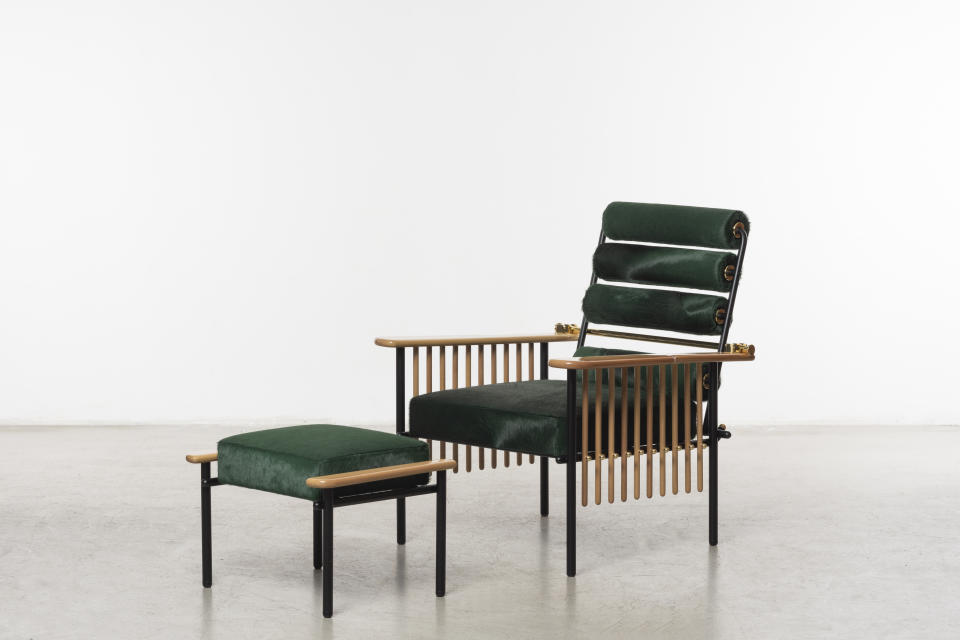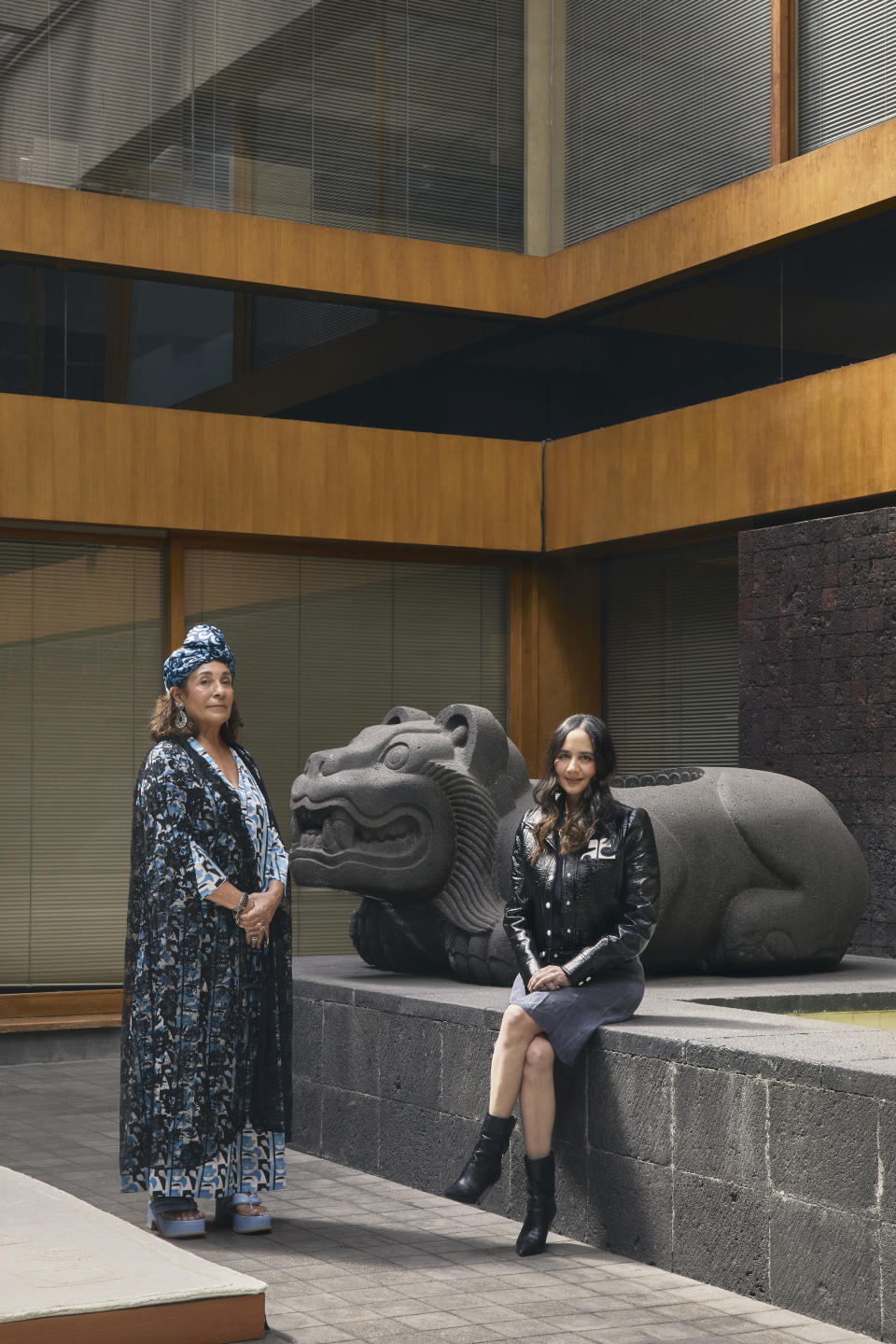Nina Yashar Takes On Mexico City’s Zonamaco

MILAN — Ever the catalyst of cross-cultural conversations, Milan-based art dealer, curator and gallerist Nina Yashar and her gallery Nilufar landed in Mexico City this week for a takeover of the modernist home designed and lived in by the late acclaimed architect Pedro Ramírez Vázquez.
Situated in El Pedregal de San Angel, considered a design-forward enclave in the ’40s, the home is characterized by its impressive courtyard, volcanic stone and the seductive, contemporary furniture Vázquez designed, alongside the crucifixes, Madonnas and religious paintings of his wife Olga.
More from WWD
Nilufar’s presence there, along with Italian rug company Cc-Tapis, is a testament to the rising importance of Zonamaco Mexico 2024, the largest art fair platform in Latin America, which closes in Mexico City on Sunday. Conceived by Mexico City based design retailer Studio 84, the event presented an opportunity for Nilufar to introduce its furniture creations to the market.
Until Sunday, pieces from Nilufar’s Open Edition have been placed around the home and offer visitors a glimpse into the ultra-high-end European designs that include the Necklace ceiling glass lamp by Milan’s Analogia Project; the Piero wall lamps by Copenhagen’s Vibeke Fonnesberg Schmidt; the Tenet and Mensa tables by Milanese designer Filippo Carandini; the Levitation Alchemia vases by Parisian architect Sophie Dries, and a selection of modular low-seating sofas, low tables and armchairs by design studio David/Nicolas, based in Lebanon, Italy and the U.S.

WWD caught up with Yashar about the landmark event and the growing importance of Mexico City’s design and art scene.
WWD: During his long career, Pedro Ramírez Vázquez designed some of Mexico’s most iconic buildings, such as the Azteca Stadium in 1961, the National Museum of Anthropology in 1963 and the Basilica of Our Lady of Guadalupe in 1974. How were you personally attracted to his life? What were the first conversations like with his son Javier?
Nina Yashar: I was initially drawn to Pedro Ramírez Vázquez’s life through his prolific contributions to modernist architecture in Mexico. When I first talked to Javier together with Cc-Tapis art director and partner Daniela Lora, we had an enlightening conversation about Pedro’s captivating translational style. I see this collaboration as a tribute to that vision. It’s an honor to be welcomed into someone’s home and invited to contribute to its narrative through the Open Edition creations that match perfectly with Cc-Tapis carpets.
WWD: How does the Vázquez residence distinguish itself among the iconic contemporary homes around the world?
N.Y.: The Casa Pedro Ramírez Vázquez is unique in its association with a renowned Mexican architect and the rich history it encapsulates. Each architectural gem has its own cultural context, and my collaboration with Studio 84 is a celebration of this specific Mexican legacy.

WWD: What inspired you to partner with Studio 84?
N.Y.: Studio 84’s work has always been admirable, especially the efforts and dedication from [Studio 84’s founder] Maria Dolores Uribe, aligning with our values but in a completely different context here in Mexico. The decision to partner with them was driven by their commitment to timeless and captivating design. This collaboration provides a platform to showcase our creations in a setting that resonates with the narrative of design evolution. It was the perfect scenario to showcase the pieces from the Open Edition that includes meticulously crafted pieces in bright hues and rich patterns, including sofas, dining tables, carpets and lighting, all art-directed by me and designed by some of the most interesting designers in the industry.
WWD: What did you hope to convey with the selection of Open Edition pieces brought to Mexico for the event?
N.Y.: The overall purpose of the pieces transcends temporal and geographical boundaries, resulting in a modern, multicultural perspective that seamlessly blends diverse styles and aesthetics, which is exactly what we intend to do here with Studio 84. We are also very pleased to share the exhibition space with one of the most thriving rug companies out there, Cc-Tapis. We share some design signatures, among them our dear David/Nicolas that designed a modular sofa and armchair for us as well as magnificent carpets for Cc-Tapis, all blended in the same space.
WWD: What was your impression when you first entered the home? How did you put your mark on it without altering it?
N.Y.: Entering Casa Pedro Ramírez Vázquez was a profound experience. I approached it with respect, acknowledging its historical and architectural significance. Our mark on the space was subtle, a careful curation of Open Edition pieces that complemented the existing design without altering its essence. It was about creating a temporary coexistence and dialogue between past and present.
WWD: Mexico City is influencing the design world more and more; why is that?
N.Y.: Mexico City’s increasing influence on the design world is a result of its vibrant culture, rich artistic heritage, and a community of innovative designers. The city’s unique blend of tradition and modernity creates a dynamic environment that fosters creativity and pushes the boundaries of design.
WWD: What is your opinion of Zonamaco as a global event, in comparison to other design fairs and festivals?
N.Y.: Zonamaco is an international fair that plays a pivotal role in bringing together diverse expressions from the design and art disciplines. It provides a platform for international collaborations, fostering a global conversation about the design field and its continuous evolution.

Best of WWD


